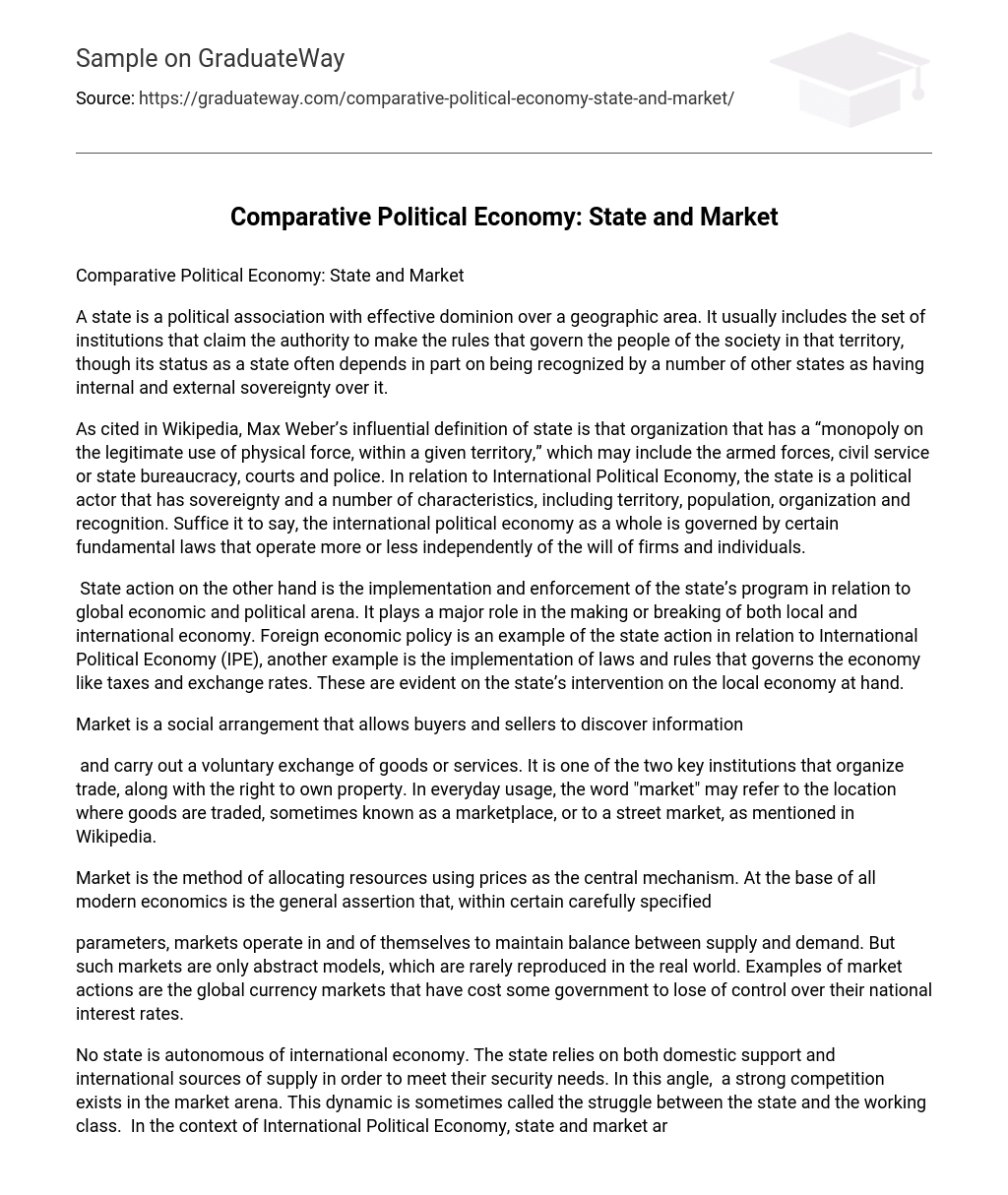A state is a political association that exercises effective dominion over a geographic area. It typically comprises institutions that claim authority to establish rules governing the people of the society in that territory. However, its status as a state often depends on being recognized by other states as having internal and external sovereignty. According to Max Weber’s influential definition cited in Wikipedia, the state is an organization with a monopoly on the legitimate use of physical force within a given territory.” This may include armed forces, civil service or state bureaucracy, courts and police.
In International Political Economy, the state is considered as a political actor with sovereignty and several characteristics such as territory, population, organization and recognition. Suffice it to say that fundamental laws govern the international political economy more or less independently of firms and individuals’ wills.
State action, on the other hand, refers to the implementation and enforcement of a state’s program in relation to the global economic and political arena. It plays a significant role in both local and international economies. An example of state action regarding International Political Economy (IPE) is foreign economic policy. Another example is the implementation of laws and rules governing the economy, such as taxes and exchange rates. These interventions are evident in how they affect local economies.
A market is a social arrangement that enables buyers and sellers to discover information and conduct voluntary exchanges of goods or services. It is one of two key institutions that organize trade, along with property ownership rights. In everyday usage, market” may refer to the location where goods are traded (sometimes known as a marketplace) or to a street market, as mentioned on Wikipedia.
Market is the method of allocating resources using prices as the central mechanism. At the base of all modern economics lies the general assertion that, within certain carefully specified parameters, markets operate in and of themselves to maintain balance between supply and demand. However, such markets are only abstract models that are rarely reproduced in the real world.
Examples of market actions include global currency markets that have caused some governments to lose control over their national interest rates. No state is autonomous in the international economy. The state relies on both domestic support and international sources of supply to meet its security needs.
In this context, a strong competition exists in the market arena. This dynamic is sometimes called the struggle between the state and working class. In International Political Economy, it is necessary for state and market to be in harmony and complementary through constant interaction.
The issue of whether the market and state are conflictual is viewed differently by scholars of International Political Economy (IPE). In practice, the weaker a state is economically, the less influence it has on the international economic interplay in the global arena, and vice versa. Liberals assert that a fundamental harmony of interests exists between countries in the international economy. They also believe that governments should manage the international economy in much the same way as they manage their domestic economies by establishing rules and regulations – known as “international regimes” – to govern exchanges (in currency and goods) between different countries.
However, some IPE scholars see the state and market as separate entities with an antagonistic dynamic. Ha Joon Chang argues that “no markets have ever emerged spontaneously, and state intervention has always played a crucial role in developing individual markets or market systems with few exceptions like Hong Kong… .the process of industrialization would have been delayed without at least some periods of heavy state involvement.”
In order to resolve the tension between the state and market, Hegemony’s theory must be considered and, if necessary, applied. According to an excerpt from an article titled What is International Political Economy?”, hegemony is defined as a wealthy and powerful state that provides stable currency, security, and a system of free trade to the international system. These public goods work best when they are widely shared among all nations. The underlying principle is that if the international community prospers, so does the hegemonic state. This theory argues that the world system thrives when there exists a hegemon to organize the international economic and political system while coordinating public goods provision (Vesseth 8-9).
In relation to International Political Economy, the logic of the state and the market is distinct. The way this relationship is viewed has a considerable impact on how the prospects for change in world order’s structures – normative and material underpinnings – are understood. A final and decisive step must be taken in accepting that, in empirical and conceptual terms, the state and market are part of the same integrated governance system: a state-market system that operates simultaneously through competitive pressures of the market and political processes shaping boundaries and structures within which competition takes place.
Works Cited
- Chang, Ha Joon. Breaking the Mould: An Institutionalist Political Economy Alternative to the Neoliberal Theory of the Market and the State,” Journal of Developing Areas.
- http://muse.jhu.edu/demo/journal_of_developing_areas/v037/37.1basher02.html
- Veseth, Michael. An excerpt from the article “What is International Political Economy?” pages 8-9.
- Wikipedia. “Market.” Retrieved on October 20th, 2007 at http://en.wikipedia.org/wiki/Market.
- Wikipedia. “State.” Retrieved on October 20th, 2007 at http://en.wikipedia.org/wiki/State.





